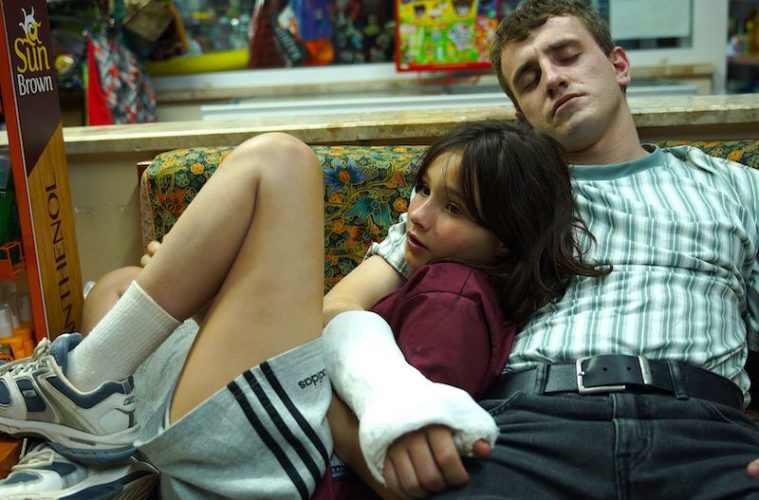 Aftersun, Scottish writer-director Charlotte Wells’ exquisite debut film, has a sneakily complex time structure that may continue to arrange itself in moviegoers’ minds after the film ends, like a personal memory that won’t quite settle into place. In the film, largely set in the 1990s, Sophie (a remarkable Frankie Corio) is an 11-year-old living in Scotland with her mother. She meets her father Calum (Paul Mescal) who lives in London, during a father-daughter summer vacation in Turkey. They spend two weeks in a second rate beachside hotel and nothing much happens, save the usual touchstones between a parent and young child. The two swim, shoot camcorder videos, and make each other smile, a lot. One night, Calum fails Sophie, badly, but with the mercy of a child, she forgives him instantly.
Aftersun, Scottish writer-director Charlotte Wells’ exquisite debut film, has a sneakily complex time structure that may continue to arrange itself in moviegoers’ minds after the film ends, like a personal memory that won’t quite settle into place. In the film, largely set in the 1990s, Sophie (a remarkable Frankie Corio) is an 11-year-old living in Scotland with her mother. She meets her father Calum (Paul Mescal) who lives in London, during a father-daughter summer vacation in Turkey. They spend two weeks in a second rate beachside hotel and nothing much happens, save the usual touchstones between a parent and young child. The two swim, shoot camcorder videos, and make each other smile, a lot. One night, Calum fails Sophie, badly, but with the mercy of a child, she forgives him instantly.
Family vacations aren’t meant to have a plot line beyond banter and ease, and for a while Sophie and Calum’s trip doesn’t appear to have one either, which may make some viewers restless. Be patient, for Wells and her gifted collaborators, among them cinematographer Gregory Oke, sound designer Mehmet Askoy, and editor Blair McClendon, mine narrative value from unexpected places. Early on, Calum puts Sophie down to sleep and though we can’t see her in the dark, the sound of her breathing fills the screen. Her breath deepening into sleep is extraordinarily moving. Life, this sonically rich film suggests, is very much about what we hear, but not necessarily about what we say.
Calum is thrilled to be with Sophie but there are hints of an inner unease. Brushing his teeth, he spits at his own reflection in the mirror. When Sophie calls on him to participate in a goofball public event, he suddenly shuts down, angering her, and seemingly confirming something crummy he believes about himself. But he’s also devoted to practicing Tai Chi, which he may be learning from the stack of self help books he’s brought on the trip. In a Turkish rug store he visits with a bored Sophie, Calum is captivated by an ornate rug. Later, he returns alone, purchases the rug, and falls back on it with a weariness that suggests a worn body and exhausted soul.
A sudden time jump forward will reveal Calum in a moment of loneliness and pain after the vacation with Sophie. Mescal plays it with his back to the camera which is so wrenching and true you may feel his psychic pain within your own body. There’s a time jump for Sophie, too. In Wells’ editorial template, we find her as an adult looking back at the camcorder footage her father shot on their Turkey trip. There’s a series of cuts to a rave club at which Calum is dancing with wild abandon. Lost in the music, he’s happy. A strobe light is flashing, which has the confusing staccato shutter of a camera flash, and of memory itself, perhaps.
Aftersun may not have a lot of story, but its artful mix of present and forward tenses does convey a nuanced relationship narrative. The rave scenes play into a multi-level mystery concerning what became of Calum after the vacation. More evocatively, the film reflects on the things we never truly know about our own lives, and about the people we have loved and thought we knew so well.
Advertising disclosure: We may receive compensation for some of the links in our stories. Thank you for supporting LA Weekly and our advertisers.

